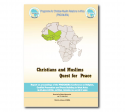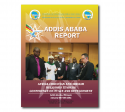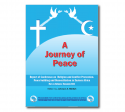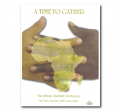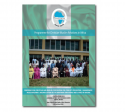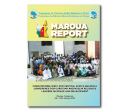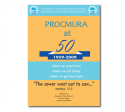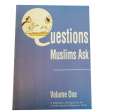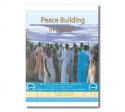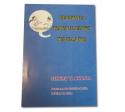Books
This book contains the proceedings of the Accra Conference which took place from 21 to 24 July 2009. The documentation of the Accra conference in its detailed form is aimed at providing readers, activists for peace and the general public with a document that will provide insight into the causes of conflict in the region, the forms that is takes to become protracted. It is also meant to provide information on how religious leaders plan to engage governments and civil society to mitigate conflicts and take measures to prevent such conflicts as was experienced in Liberia, Sierra Leone and Côte d’Ivoire from recurring in the region.
The 2012 Addis Ababa conference with the theme Africa Christian and Muslim Religious Leaders for Peace and Development was special in many ways. This is because it brought together Christians and Muslims from a cross-section of the African continent: West Africa, East Africa, Central Africa, North Africa and the Indian Ocean. This cross-section of participants was deliberately chosen to enable them to share good practice as well as concerns and visions of Christian and Muslim relations into the future.
The gathering of Muslims and Christians in the Eastern African city of Dar-es Salaam, Tanzania, to conference on conflict prevention, peace building and Reconciliation, was one of the very few occasions in Africa where one could reflect and say Christians and Muslims are now doing what they should have been doing a long time ago.
It is beyond a shadow of doubt that within the last twenty years, extremism, fanaticism and polarization have been on the rise, even while Interfaith Dialogue is taking place and is also on the rise; at the same time, when people who are involved at Interfaith Dialogue for accepting the other, listening to the other, and tolerance we see that insulting the other and depraving the other of human rights is also on the increase. This paradox is dissected in the proceedings of the conference.
Our efforts to work towards Christian and Muslim constructive relations for peace and peaceful co-existence unveiled the complexity of the situation we are dealing with. The complexity, it has to be said, defies the simplistic notion of the outside world who easily jump to the conclusion that violent conflicts in the northern part of Nigeria essentially religious conflicts. It is far from that. What can be said to be true though is that those who engage in such conflicts are people who profess to be Christian or Muslim and are sometimes known to use their religious labels as a rallying cry for support.
The Maroua conference on the theme “Francophone West and Central Regional Initiative for Christian and Muslim Religious Leaders for Peace and Development” drew participants from twelve (12) countries, namely: Benin, Burkina Faso, Central African Republic, Chad, Democratic Republic of Congo, Guinea, Mali, Niger, Rwanda, Senegal, Togo and the host country, Cameroon. They deliberated among others on the role of religious leaders in building sustainable peace and developed.
In this book we read stories, experiences and challenges of those veterans of PROCMURA, who were there, or at least around when PROCMURA then ISLAM IN AFRICA PROJECT (I.A.P) was founded. The evolution of Islam in Africa Project to Project for Christian-Muslim Relations in Africa is fully captured by those who were present at the time.
In Christian-Muslim relations, one of the areas of misunderstandings is the belief system of the other. In PROCMURA’s experience, Christian’s statements of faith and practice are not always appropriately made clear to Muslims in dialogical discussion. Over the years, common questions that Muslims wish to know about Christianity have been documented by PROCMURA’s central office.
As Inter-faith engagements towards conflict prevention, justice, peace and reconciliation may be obvious to understand, intra-faith engagement towards the same goal may not be quite obvious. This is what we seek to clarify.
Katika mahusiano kati ya Wakristo na Waislamu, mojawapo ya mambo yaletayo kutokubaliana ni sera ya imani kwa nyingine. Kwa uzoefu wa PROCMURA, maelezo ya imani ya Kikristo na desturi mara kwa mara hayajadhihirishwa kwao Waislamu katika majadiliano ya ana kwA ana.Kwa muda mrefu sasa, maswali ya kawaida ambayo Waislamu wangependa kuyaelewa kuhusu Ukristo yamechapishwa kwenye ofisi kuu ya PROCMURA.

Programme for Christian-Muslim Relations in Africa (PROCMURA),
P.O. Box 66099 – 00800 Nairobi
Prof. Saitoti Avenue, Westlands,
Phone: +254 (020) 444 5181 / 445 1342,
Email: [email protected]

